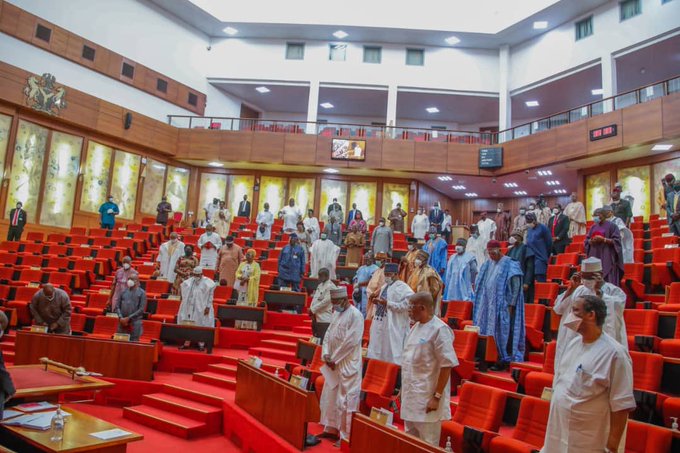The Nigerian Senate has initiated a significant move to reclaim the country’s monetary sovereignty. A new bill that prohibits the use of foreign currencies for transactions, including salaries, has successfully passed its first reading in the Senate.
The proposed legislation, titled “A Bill for an Act to Alter the Central Bank of Nigeria Act, 2007, No. 7, to Prohibit the Use of Foreign Currencies for Remuneration and for Other Related Matters,” is a direct response to the growing dominance of foreign currencies like the US Dollar and the British Pound in Nigeria’s economy.
Senator Ned Munir Nwoko, Chairman of the Senate Committee on Reparations and Repatriation, introduced the bill. He argued that the widespread use of foreign currencies undermines the value of the Naira and poses an ongoing threat to Nigeria’s economic stability.
“The use of the Dollar, Pound Sterling, and other foreign currencies for domestic transactions is a relic of our colonial past,” said Senator Nwoko. “This practice continues to hurt Nigeria’s economic independence and weakens our local currency.”
If passed, the bill will make it illegal to conduct payments and transactions, including salaries, in any currency other than the Naira. This includes ensuring that all workers, both Nigerian and expatriates, are paid in Naira. It also mandates that crude oil and other exports must be sold exclusively in Naira, compelling international buyers to acquire the local currency.
Senator Nwoko emphasized that the bill aims to bolster confidence in the Naira, positioning it as the central currency for all financial operations in the country. By eliminating foreign currencies from domestic transactions, the legislation aims to reduce the informal currency markets that fuel unethical practices like round-tripping by banks.
“The Naira will no longer be relegated to a secondary role in its own economy,” Senator Nwoko stated. “This bill is about reclaiming Nigeria’s economic independence and fostering national pride.”
Under the new law, banks will also be required to provide loans at affordable interest rates to stimulate industrialization and promote economic growth. This will be paired with efforts to store Nigeria’s foreign reserves domestically, ensuring greater economic sovereignty and reducing the country’s dependence on external financial systems.
The bill advocates for an increase in demand for the Naira, especially by making it the exclusive currency for exports. This would drive up its value and encourage greater international confidence in the currency.
One of the most controversial aspects of the bill is its provision to standardise salary payments. By mandating that all workers, including expatriates, are paid in Naira, the bill aims to create a level playing field and promote fairness in remuneration across the country.
“Expatriates and Nigerian workers should be paid in the same currency,” Senator Nwoko explained. “This will ensure fairness and reduce any disparity caused by foreign currency payments.”
The bill also seeks to address the challenge of informal currency markets and provide a solution to the growing concern over Nigeria’s over-reliance on foreign exchange for travel and other needs. Senator Nwoko assured Nigerians that reforms in banking systems would ease access to foreign exchange for legitimate purposes, such as travel allowances.
Learning from Morocco’s Success
To illustrate the potential benefits of the bill, Senator Nwoko pointed to Morocco’s success in maintaining a stable and resilient economy. The Moroccan Dirham, he noted, has maintained its value against major currencies for over 35 years, largely due to the country’s policy of exclusively using its local currency for domestic transactions.
“We are not reinventing the wheel,” Nwoko said. “Morocco has done it. With Nigeria’s vast resources and dynamic population, we can do it too.”
He further suggested that if the bill is passed, Nigerian banks could expand internationally and offer financial tools that would simplify global transactions. One of the key goals is to make domiciliary accounts increasingly unnecessary, reducing the reliance on foreign currencies for international transactions.
The bill’s passage could usher in a transformative period for Nigeria. With its rich natural resources and vibrant population, the country stands in a prime position to surpass other economies that have successfully managed their currencies. By prioritizing the Naira in both domestic and international transactions, Nigeria can build a stronger and more diversified economy.
Senator Nwoko envisions a future where Nigeria becomes a model of economic self-reliance. He believes that the use of the Naira as the primary currency will foster economic growth, reduce import dependency, and ultimately lead to a more sustainable future.
“Nigeria has everything it needs to succeed,” Nwoko concluded. “This bill will be the first step toward realizing that success, by strengthening our currency and securing our economic future.”

